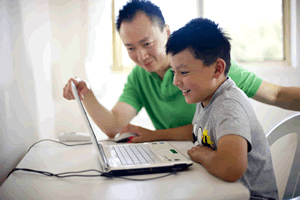 The internet offers a wealth of learning and leisure opportunities for children. Increasingly, children are online and connected and for most, the experience is a good one.
The internet offers a wealth of learning and leisure opportunities for children. Increasingly, children are online and connected and for most, the experience is a good one.
However understandably, many parents and carers worry that their children may experience cyberbullying – or perhaps cyberbully others – when their personal and virtual worlds collide.
Parents are encouraged to regularly and proactively discuss online safety with their children to help prevent cyberbullying. And if children do encounter problems online, we know that they overwhelmingly turn to their parents for advice and support.
Cyberbullying is the use of technology to bully a person or group. Bullying involves deliberately and repeatedly attempting to hurt, scare or exclude someone. The main purpose is to have power over someone else.
Cyberbullying can cause distress and can lead to loneliness, anxiety and depression. It can also affect children’s concentration and lower their achievement at school. Cyberbullying is particularly nasty because it is often done in secret, shared with a lot of people, and difficult to remove.
KidsMatter psychologist Dr Lyn O’Grady says parents are best placed to educate their children about cyberbullying. Dr O’Grady warns that communication is just as important as setting boundaries.
“We know that technology is becoming an increasingly important part of children’s everyday lives. And while our instinct might be to protect them from it, and even take away their access to avoid problems, this approach won’t really equip kids in the long term,” she said.
“Communication is one of the best ways to help children be safe online, now and into the future. It’s really important they feel that they can tell someone if they feel uncomfortable or are worried about things like cyberbullying, rather than staying quiet for fear their devices will be removed.”
“The strategy that will work best for us as parents includes having an awareness of the issues, finding ways to talk regularly to children, listening to what they think, and working with them to get a balance between safe technology use and other things like spending time outdoors.”
To help prevent cyberbullying, KidsMatter encourages parents to:
- Communicate with your children. Communication continues to be the key to successful relationships. It helps parents learn about what’s happening in their children’s lives and address any concerns such as cyberbullying.
- Talk to your kids about what they’re doing online. Children benefit from assertive parents who actively monitor their technology use. Just like in the face-to-face world, the younger the child, the more supervision they require in the digital world.
- Reinforce your values. Think about the digital world as an extension of the face-to-face world and encourage children to match their offline values with their online behaviour.
- Keep up to date with current programs and apps. Choose those that look good and use them with your children. Talk to your child’s school and other parents about with they are doing.
For more information about cybersafety, go to www.kidsmatter.edu.au/families/enewsletter
KidsMatter is a mental health promotion, prevention and early intervention initiative for primary schools and early childhood education and case (ECEC) services that is proven to make a positive difference to the lives of Australian children. KidsMatter has been developed in collaboration with beyondblue, the Australian Psychological Society and the Principals Australia Institute, with funding from the Australian Government Department of Health and beyondblue.



